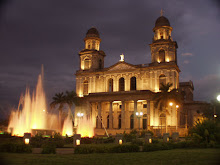
The article "Disaffected Sandinistas say Daniel Ortega has become a dictator" in The Times on July 20, 2009 reported:
As the red-and-black flag of the Sandinistas flew high over Managua yesterday in celebration of the 30th anniversary of the Nicaraguan revolution, Daniel Ortega claimed that the US would once again try to invade the Central American nation.
Addressing thousands of supporters in the Plaza de Fe, President Ortega said that America had orchestrated the recent coup in Honduras and planned to turn Colombia into “an occupied country”, filling it with military bases from which to threaten leftist governments in the region.
“The US is filling Colombia with military bases to threaten all our brothers in Latin America, to threaten the Bolivarian revolution [in Venezuela] . . . to destroy the fight the people of Latin America are bringing,” he said. “They are going to try and invade Nicaragua. Come and try to invade Nicaragua! Come and try and defeat this people! But we will never be defeated.”
The faithful had been arriving in Managua for days to celebrate the victory over the dictator Anastasio Somoza. But 15 minutes after the man known as “Comandante Daniel” began to speak, the crowd began to thin noticeably. When The Times left the plaza at the end of his speech, only the most fervent remained, the waiting buses already filled with people.
For many Sandinistas President Ortega’s 21st-century makeover has not been able to mask the failures of the movement that once promised so much. Nicaragua suffers from extreme poverty, so much so that the Government announced before the anniversary a celebration of “austerity” and attached the number 30 to last year’s Christmas lights for the festivities.
Many leading Sandinistas stayed away, having long since deserted President Ortega. They accuse him of abandoning the principles of the revolution in favour of pursuing personal power.
Carlos Fernando Chamorro, a former editor of the Sandinista party newspaper Barricada, is one of many one-time allies who accuse Mr Ortega of pillaging public funds, oppressing critics and stealing elections as, they say, he comes to resemble the dictators he once despised.
Mr Chamorro, a leading journalist, says that he was accused of being a drug trafficker and a robber of peasant lands, and last year the Government launched a money-laundering inquiry against him even though prosecutors admitted that they had no evidence.
“It is a message ... that those who try and enter on to this ground of investigation of power will find serious consequences,” he told The Times. “Ortega is a revolutionary leader who became a traditional caudillo.”
Other dissidents have been accused of being traitors and CIA agents — a dangerous label in a country still menaced by the memory of the US-backed Contras. Enrique Sáenz, the president of the breakaway Sandinista Renovation Movement, has seen his car set alight by Ortega supporters, and party buildings attacked. “They treat us like enemies,” he told The Times.
Nonetheless, Mr Ortega retains a hard core of supporters buoyed by social programmes. Critics complain the programmes are accessible only to those who sign up as militantes of the Sandinista National Liberation Front, but to the faithful this is of little concern.
José Leopoldo Rodríguez, 65, a former farm labourer from Santo Domingo, said that the President had done for impoverished Nicaraguans what no other government had. “Is it a dictatorship? Maybe. But now it’s a dictatorship of the poor, not of the rich.”




